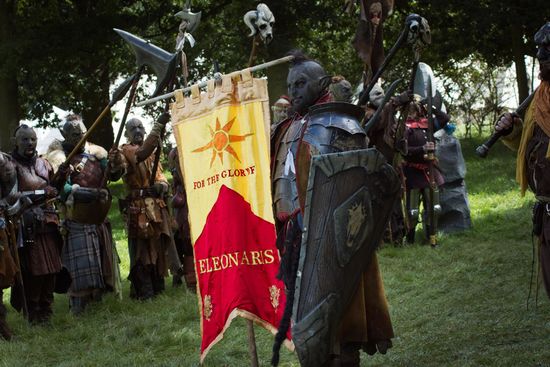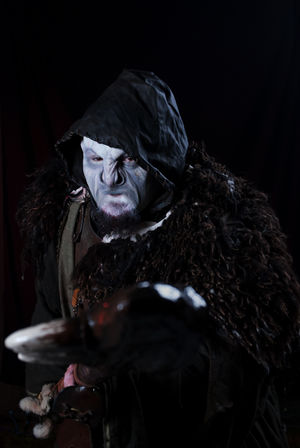Imperial Orcs leadership
Overview
Most Imperial Orcs choose to belong to a legion. The legions are organized along military lines, and choose one of the Imperial Orc armies to be part of. In practice the legions are a cross between a regiment and an informal family group. Although not all the members of a legion are warriors, or even members of the army, the camaraderie and mindset of the career soldier tends to permeate throughout a legion.
Each orc legion chooses its own name and symbols but most can also be identified by their favoured fighting style.One legion may have a bias for plate armour and pole-weapons, while another favours sword and shield. Warriors are usually expected to have at least a basic mastery of their legion's favoured style. Each legion is fiercely proud of its identity in battle, and a healthy, good natured rivalry exists between legions with regard to tactics and combat style. This rivalry is put aside on the battlefield, and warlords are careful to ensure that it never undermines loyalty and service to the Empire; the place for combat between members of rival legions is the fighting pit, not the battlefield.
Banners are particularly important to Imperial Orcs. Legion camps are often decorated with banners displaying legion symbols, as Orcs find it reassuring to be surrounded by images that reinforce their group identity. Many bear an image of the horse as a symbol of the Empire alongside specific legion markings and colours. Imperial Orcs differentiate between banners, which are general symbols of legion identity, and a legion standard. Many legions have a legion standard, which is a symbol of the legion's pride. Trophies from particularly notable legion members or items of exceptional worth that once belonged to someone in the legion are often added to a legion standard.
Legions chose their own commanders, called warlords, with individuals chosen for their ability to provide clear effective leadership in battle, according to the traditions of the individual legion. Orcs expect their leaders to be inspirational as well as astute so the majority of warlords are powerful warriors who lead from the front. Those who lead by cunning alone need to be particularly smart and their legions are often small but very tight knit. Warlords appoint members of the legion to a chain of command beneath them, so that if they fall in battle they can be quickly replaced – the life of the legion is always more valuable than the life of any individual.
Most legions have a clear chain of command with harsh punishments for disloyalty or disobedience. Imperial Orcs usually have little sympathy with individuals who refuse to follow orders. In battle, those who find themselves at odds with a legion’s leadership face summary court martial, at other times they are usually expelled from the legion. In such cases a group of orcs usually form their own rival legion, while an individual must attempt to join another legion or face existence alone.
Few Imperial orcs have much time for or interest in the sophisticated political intrigues so popular in places such as the League. They are perfectly capable of understanding that a senator might say one thing and mean another, but among themselves they expect plain talking. In part this is because Imperial Orcs expect and demand an unyielding chain of command. Leaders amongst the orcs will usually explain the details of a plan because they want their followers to understand it, but they rarely if ever feel the need to justify it. In the view of most Imperial Orcs you either trust your leaders implicitly or you choose someone different to follow. Undermining your leaders weakens the whole legion, and is regarded with contempt when done to advance your own position.
Leading a territory
With the new Imperial Orc homeland being established in Skarsind, the Imperial Orcs can now elect a senator to represent them in the Imperial Senate. After consultation with the Imperial Orc egregore, the civil service have determined a constitutionally valid process whereby to elect a senator. The outcome is as follows.
Any Imperial Orc citizen can stand for election as senator. Any Imperial Orc soldier who lives in the territory that is to be appointed can participate in the election. The egregore's decision to restrict the ability to vote to soldiers reflects the fact that the tens of thousands of Imperial Orcs are at heart a militaristic people. Their natural instinct is to fight, and it is something that they feel defines their essential nature.
In this case, the civil service recognises as a soldier any Imperial Orc who has the will to face the enemies of the Empire. If any orc wishes to question the right of another to claim the title of soldier, the egregore will arrange for them to show their will to fight in the fighting pit against an opponent of the egregores choosing. Once mettle has been proven, no further challenges will be accepted that summit.
Once the candidates have made themselves known, each in turn is invited to present an item of worth and explain its significance to the candidate or the nation. The egregore has recommended this method because the Orcs need to be represented by someone who can hold their own in an arena where debate and the ability to express oneself are key.
After each candidate has spoken, those orcs eligible to vote can place a weapon in front of the speaker they support. Once every orc has had their chance, the number of weapons is counted and the orc that has received the most becomes the new senator.
- Anyone can stand as senator
- Only people who are from the territory can vote
- voting is "any soldier of the Imperial Orcs" - if in doubt the egregore will arrange a pit fight
- Candidates make a speech about an item of worth
- Voters place a weapon before their chosen candidate.
- Majority support takes the seat
Generals
When the Imperial Orcs had no territories of their own, they did not possess senators. As a result the effective leadership of the nation lay with the warlords, and most especially with the two Imperial Orc generals. Generals were chosen by bouts between legion members under rules agreed when the orcs joined the Empire. When they gained control of the territory of Skarsind, this process was abandoned in favour of appointing a Senator who in turn appoints both generals.
Shamans
Shamans play an important role in the leadership of Imperial Orc society. Their link to the orc ancestors is considered to provide valuable insight and wisdom. By tradition shamans are consulted by Imperial Orc senators, generals, and warlords before significant decisions are made, so that they can provide the ancestor’s guidance. A warlord or similar individual might have a specific favoured shaman they regularly consult, but senators and generals are more likely to speak to all the shamans present. Individual Orcs also seek out shamans for advice when they make important decisions, either to receive guidance in making up their minds or to see how the ancestors feel about the course of action they have decided on.
It is not uncommon to ignore the advice shamans give though it should always be weighed and considered. The orcs' barbarian ancestors do not understand the life of the Imperial Orcs, and their voices tend to be the loudest of those heard by the shamans. There are exceptions; some shamans possess enough wisdom that their advice is valuable even when it does not come directly from an ancestor, and other shamans have an affinity for one or more helpful ancestors whose words often seem to be more relevant to their Imperial descendants.
Prominent Imperial Orcs Legions
A short list of well-known Imperial Orcs legions who regularly attend Anvil can be found here.

